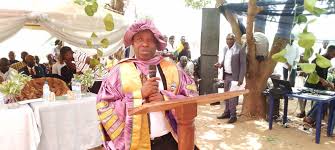Stories by Francis Adinoyi Kadiri
Abuja
The National Building Code, which was first published in 2006 and reviewed in 2013 by the National Building Code Advisory Committee (NBCAC) in order to address certain lapses and omissions observed in the First Edition, will be enforced by the Federal Ministry of Lands and Urban Development, the minister of Lands, Housing and Urban Development, Mrs. Akon Eyakenyi has said.
The minister who made the disclosure at the 2014 Ministerial Platform last week said the code was revised in order to “bring the Code in line with the current global realities, developments and emerging trends as they affect the building construction industry, and address the increasing spate of building collapse across the country.”
The minister said the Revised National Building Code has been finalized as one of the enabling instruments for ensuring quality and enhancing standards in the housing and urban development sector, adding that when approved
“On approval by the Federal Executive Council, the Ministry will champion the process of ensuring compliance with its provisions through proper enforcement by the three tiers of Government, Professional and Regulatory Bodies, and other relevant stakeholders,” she said, adding that the House of Representatives has commenced the process of enacting a law to enforce the provisions of the National Building Code in the Federal Capital Territory, Abuja.
“In consonance with Sections 1, 2 and 3 of the Code, all the States of the Federation are expected to domesticate the proposed Act of the National Assembly in their respective States to ensure effective implementation of the Code nationwide,” she said.
Speaking further, the minister said a draft roadmap for the Housing and Urban Development Sector has been developed by the Ministry in consultation with all relevant stakeholders. “It was reviewed on 10th July, 2014 at an enlarged Meeting of the Management of the Ministry and the Ministerial Expert Group (MEG) which was charged with the responsibility of preparing the document.”
According to her, the draft Roadmap was further reviewed, consolidated and adopted for implementation at a Stakeholders Validation Workshop held in Abuja.
She said when the regulatory document is finalized, it will be adopted by various stakeholders.
“Apart from the fact that it will be adopted by the National Council on Lands, Housing and Urban Development, the roadmap when validated, will be presented to the Economic Management and Implementation Team (EMIT) to get their input and buy-in,” she said, adding that it will be further presented to the National Economic Council (NEC) to also get their input and buy-in.
Other stakeholders that will be further presented with the roadmap are the Federal Executive Council (FEC) for consideration and approval, and the Nigerian public.
“The roadmap outlines the sets of actions to be undertaken for the sustainable transformation of the Housing and Urban Development Sector in Nigeria over a 30-year period (2014-2043). It has been aligned with the National Integrated Infrastructure Master Plan (NIIMP) and other Sectoral Plans of Government for national development,” she added.



